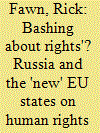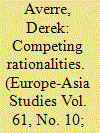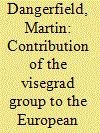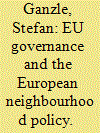|
|
|
Sort Order |
|
|
|
Items / Page
|
|
|
|
|
|
|
| Srl | Item |
| 1 |
ID:
092154


|
|
|
|
|
| Publication |
2009.
|
| Summary/Abstract |
During the August War of 2008, many Western governments that had previously been supporters of Georgia tempered their views on the causes of the conflict and moderated their support for the government of Mikhal Saakashvili. By contrast, the governments of several post-communist countries were forthright in their backing of Georgia. The presidents or prime ministers of Poland, Estonia, Latvia and Lithuania, as well as Ukraine, even travelled to Georgia during the war to demonstrate their solidarity.
|
|
|
|
|
|
|
|
|
|
|
|
|
|
|
|
| 2 |
ID:
092151


|
|
|
|
|
| Publication |
2009.
|
| Summary/Abstract |
They conclude that, with Russia having taken a different path from the liberal-democratic evolution chosen by Central and Eastern European countries, it is not clear what model of relations Moscow and Brussels should be aiming for (Karaganov & Yurgens 2008, p. 4). Their diverging positions are manifested not only in the increasing difficulties in their bilateral relationship but also in their approaches to the shared neighbourhood. In particular, the conflict between Russia and Georgia over the separatist region of South Ossetia in August 2008-and the criticism by the EU and many of its member states of Moscow's disproportionate reaction and its recognition of South Ossetian and Abkhazian independence-only indicated the shallowness of the putative 'strategic partnership'. Indeed, it led to the conclusion in Brussels that 'relations between the EU and Russia have reached a crossroads'.
|
|
|
|
|
|
|
|
|
|
|
|
|
|
|
|
| 3 |
ID:
092157


|
|
|
|
|
| Publication |
2009.
|
| Summary/Abstract |
The European Neighbourhood Policy (ENP), launched by the EU in May 2004 as the framework for relations with new Eastern neighbours, looked inadequate before it had even got off the ground. The ENP fell well short of what the Ukrainian 'Orange' politicians expected, was rejected by Russia and also faced a well of criticism from inside the EU.
|
|
|
|
|
|
|
|
|
|
|
|
|
|
|
|
| 4 |
ID:
092156


|
|
|
|
|
| Publication |
2009.
|
| Summary/Abstract |
The collapse of the Soviet Union in 1991 produced 15 newly independent states from the former Soviet republics.
|
|
|
|
|
|
|
|
|
|
|
|
|
|
|
|
| 5 |
ID:
092152


|
|
|
|
|
| Publication |
2009.
|
| Summary/Abstract |
Since 2002 the European Union (EU)1 has sought to flesh out a proximity policy to deal with its immediate vicinity in the light of EU Eastern enlargement. Several labels, such as 'Eastern (and Southern) Dimension', 'Wider Europe', 'European Neighbourhood Policy' (ENP), 'ENP plus' and, eventually-with regards to East European countries outside the EU-'Eastern Partnership' have been used to capture the EU's policy vis-a-vis its different neighbours. So far, Algeria, Israel, the Palestinian Authority, Armenia, Jordan, Syria, Azerbaijan, Lebanon, Tunisia, Ukraine, Egypt, Moldova, Georgia and Morocco have been recognised as 'ENP partner' countries.
|
|
|
|
|
|
|
|
|
|
|
|
|
|
|
|
| 6 |
ID:
092150


|
|
|
|
|
| Publication |
2009.
|
| Summary/Abstract |
The European Union (EU) and Russia's'shared neighbourhood' of Ukraine, Moldova, Belarus, Armenia, Azerbaijan and Georgia was, according to Lowenhardt, writing in 2005, 'an economic and diplomatic battlefield' (Lowenhardt 2005) The period that has followed has seen this agenda develop into a mainstream political debate on the prospects for European security and spill over into the military domain with the conflict in South Ossetia in August 2008. This conflict and the Ukrainian energy crisis in January 2009 have contributed to the generation of a new post-Cold War low point in EU-Russia relations.
|
|
|
|
|
|
|
|
|
|
|
|
|
|
|
|
| 7 |
ID:
092153


|
|
|
|
|
| Publication |
2009.
|
| Summary/Abstract |
It seems that for the European Union (EU) its relationship with Russia is fraught with bitter frustrations. If we take the optimistic rhetoric of the 1990s at face value, then the relationship and later strategic partnership with Russia was to result in a substantial degree of convergence and cooperation between the parties. In the words of the Union's Common Strategy on Russia, the aim was nothing less than:
A stable, democratic and prosperous Russia, firmly anchored in a united Europe free of new dividing lines … [and] a stable, open and pluralistic democracy in Russia, governed by the rule of law and underpinning a prosperous market economy benefiting alike all the people of Russia and of the European Union.
|
|
|
|
|
|
|
|
|
|
|
|
|
|
|
|
| 8 |
ID:
092155


|
|
|
|
|
| Publication |
2009.
|
| Summary/Abstract |
The EU has been variously described as a global power, a superpower, a civilian power, a trade power, a normative power, a realist power and an ethical power, but it remains unclear when and how the EU really can exercise its power effectively.
|
|
|
|
|
|
|
|
|
|
|
|
|
|
|
|
|
|
|
|
|